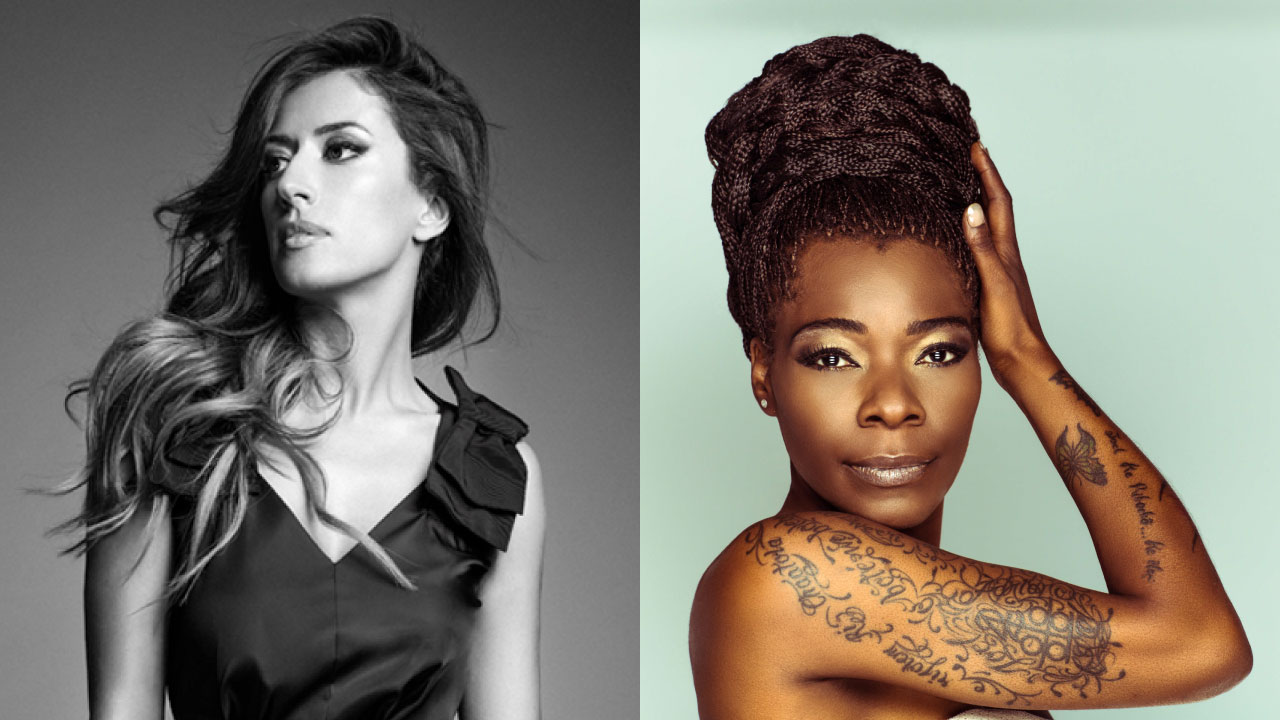Ana Moura, the Portuguese fadista, and the Spanish-born singer Concha Buika, known for coplas, flamenco and jazz, lead parallel musical lives. Both are mega-stars with strong roots in their individual musical traditions. Both have distinct voices that are constantly compared to the greats to whom they each have been influenced. Both are strong, beautiful and creative women who are taking their traditions into the future while defining their individual sound.
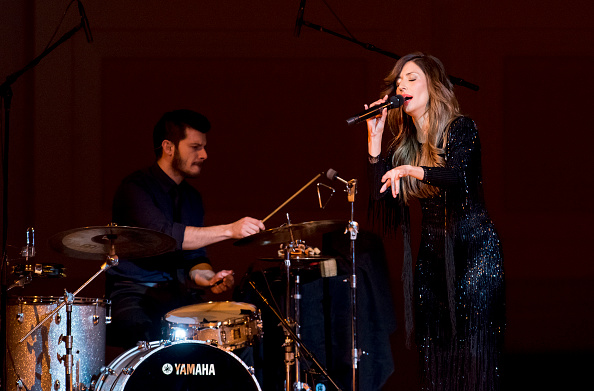
Portuguese fado singer Ana Moura (born Ana Claudia Moura Pereira) performs with her band at Carnegie Hall, New York, New York, April 26, 2016. With her is Mario Costa on drums. (Photo by Jack Vartoogian/Getty Images)[/caption]
On Tues., April 26, Ana and Buika graced Carnegie Hall’s Stern Auditorium to a sold-out crowd. Ana Moura glided onto the stage wearing a long, black, shimmering evening gown. Her voice, low-pitched and sensual, revealed a quintessential fadista aesthetic filled with nostalgia, melody and soul. Her set included hit songs “Dia de Folga” and “Fado Dançado.” She quoted Kafka and sweetly reminded us to keep in mind the similarities in “music rather than the differences.” She also dedicated a heartfelt a cappella version of Carlos Vieira Dias’s “Mbiri Mbiri” to the late, great artist Prince, who in 2010 asked her to join him on stage to sing two of her songs.
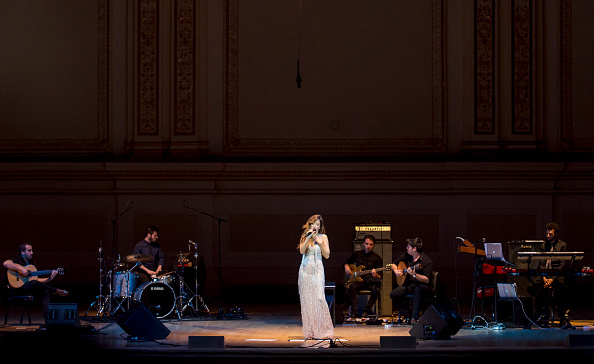
Portuguese fado singer Ana Moura (born Ana Claudia Moura Pereira) performs with her band at Carnegie Hall, New York, New York, April 26, 2016. With her are, from left, Pedro Soares, on acoustic guitar, Mario Costa, on drums, Andre Moreira, on electric bass guitar, Angelo Freire, on Portuguese guitar, and Joao Gomes, on keyboards. (Photo by Jack Vartoogian/Getty Images)[/caption]
Her musicians, Ângelo Freire on Portuguese guitar, Pedro Soares on acoustic guitar, André Moreira on bass, João Gomes on keyboard and Mário Costa on drums and percussion, contributed beautifully to the evening’s performance of melancholia with striking countermelodies. The ensemble’s combination of traditional and nontraditional instrumentation maintained fado’s foundation while increasing the sound’s scope. The musical interchange between Moura and Freire was an awe-inspiring and touching experience. For her finale she sang her uptempo mega-hit “Desfado” and encouraged everyone to sing. Even if you didn’t speak Portuguese, her voice moved everyone to at least make an attempt. The captivated audience rose to their feet with thundering cheers. Moura’s performance dispels the notion of fado’s wistfulness with charming yet contained charisma. She may be a classic fadista songbird following in the footsteps of Amália Rodrigues and Mariza, but it is her experimental approach and appeal that make her a crossover success.
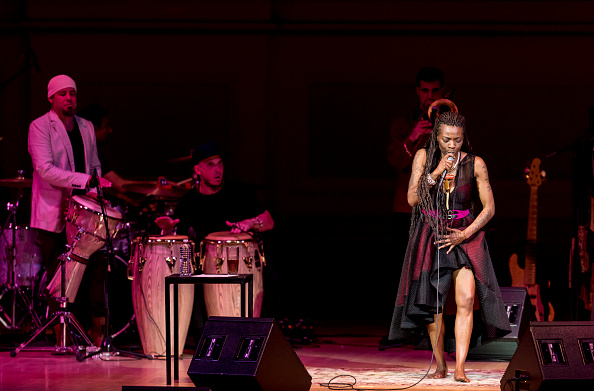
Spanish composer and singer Buika (born Maria Concepcion Balboa Buika, aka Concha Buika) performs with her band with Ahmed King Barroso (white cap) on percussion, Alexis 'Pututi' Arce on congas, and Santiago Canada Valverde on trombone at Carnegie Hall, New York, New York, April 26, 2016. Buika's parents are from Equatorial Guinea in Africa. (Photo by Jack Vartoogian/Getty Images)
After much anticipation, Buika illuminated the stage wearing her beautiful gap-tooth smile and a splendid black and pink flared midi dress. Her fans roared with applause and cheers. Taking center stage, she graciously gave thanks to all, reached for a glass and before taking a sip, poured libations onto the stage floor, paying homage to all of the ancestors, singers and compatriots that have come and gone before her. The band, led by musical director/guitarist, Ahmed King Barroso, included Michel Ferré on keyboard, Josue “Ronkio" Rodriguez on bass, Santiago Cañada Valverde on trombone, and Alexis “Pututi” Arce on drums and percussion. They kicked off the set with “Vivir Sin Miedo” and Buika began to improvise the first few melodies in her spirited and husky signature voice. The song is the title track from her fifth studio album where she sings about “Living Without Fear” in English and Spanish to a reggae feel. The gypsy-infused guitar strumming and heavy rim-shot snare on the soulful “Si Volveré” moved the audience to groove and dance in their seats. “Volverás” was bold, confident and sincerely emotional. Buika has clearly brought the classic 1929 Cuban standard “Siboney,” by Ernesto Lecuona, into the 21st century with her passionate, raspy scatting and phrasing. As the end neared she graciously asked the audience to make a request. The choice was the woeful and melancholy hit, “Mi Niña Lola,” followed by the finale, “Mucho Dinero.” The one thing that can always be expected from Buika’s performances is her unrestrained sense of urgency.
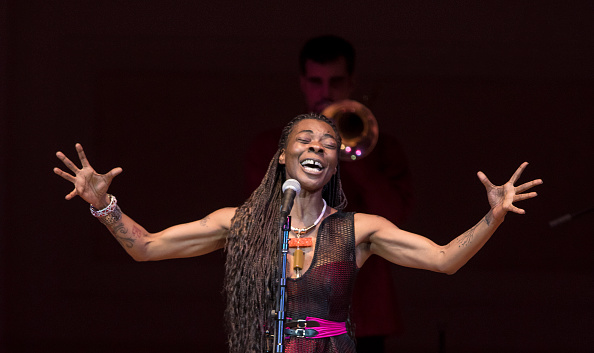
Spanish singer Concha Buika performs with her band at Carnegie Hall, New York, New York, April 26, 2016. Behind her is Santiago Canada Valverde on trombone. (Photo by Jack Vartoogian/Getty Images)[/caption]
The audience roared with applause and cheers but they wanted more. Ten minutes after the finale, fans were still calling out her name, begging for an encore. Many even began singing the soccer chant, “Olé, Olé, Olé.” When everyone realized she wasn’t coming back out, we made our way to the exit knowing deep in our hearts that she really wanted to sing just one more.
Experiencing traditions in new forms is always inspiring. Ana Moura and Concha Buika, two legends in the making, are determined to do it in their way. Both are fearless artists with tremendous voices and independent spirits, differentiated only by the uniqueness of their individual musical expressions.








